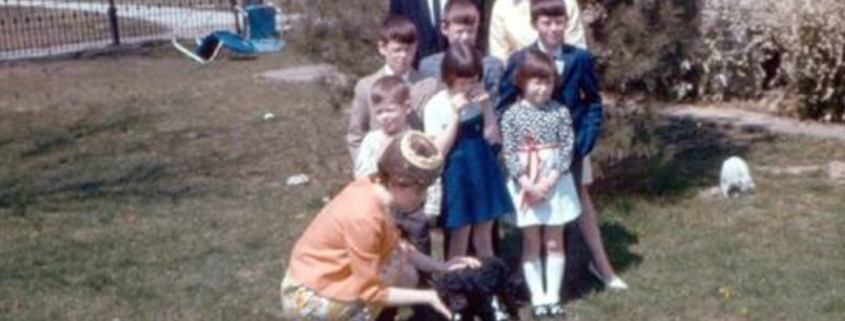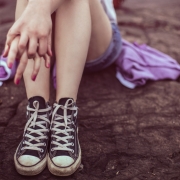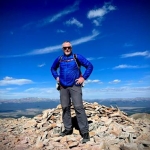Our Country’s Greatest Scourge – Reflections on “It was Me all Along: A Memoir,” by Andie Mitchell | Healthy Aging Series: Season 9, Episode 2
I am a cyclist. I don’t ride as much as I used to ride because my primary sport is backpacking and I’m usually preparing for backpacking trips to places like the Red River Gorge, the Smokies, the Grand Canyon, Colorado, or Utah.
When I was 55, I rode my bicycle across the state of Indiana in one day. They call it the RAIN Ride. It was on my birthday, and it started in Terre Haute, my birthplace. Pretty cool.
A year later, I flew to DC, took my bike, and rode the Vernon trail from Mount Vernon to DC, about 20 miles. I rode through the District Columbia and hooked up with a couple of local cyclists that guided me to the Adams-Morgan neighborhood, and finally to the Tryst Coffee Chop next to the Madam’s Organ Bar. Also, a cool trip.
It was a memorable trip, because of the conversation that I had with a musician I met near downtown Alexandria, just off the Vernon trail. I had stopped to take a bathroom break and struck up a conversation with a gentleman setting up his glass harp. He shared information about his life. He had immigrated as a young child from Eastern Europe. He told the story about how his father had a problem with alcohol. That they lost the family home and everything they owned because of his drinking problem. “Alcohol is the scourge of this country,” he declared.
My heart broke for him. It’s not the first time I’d heard a story like this. My son’s great-great grandfather lost his ranch to alcoholism.
But I beg to differ with him.
The Real Scourge in this Country
There’s no doubt that alcoholism is a devastating social problem in our country and in the world, but I have come to believe that there is a more devastating scourge in this country, and that is childhood obesity.
According to the Center for Disease Control, for children 2 to 19 years old, from 2017 to 2020, 1 in 5 are obese or about 14.7 million. We are not talking about being overweight but being obese or having a BMI of over 30. Compare that to the obesity rate of 1 in 20, in 1974, the year I graduated from High School. Some of the reasons for this increase are easy access to high-calorie junk food, few opportunities for physical activity, a lack of parks and playgrounds, and at least one parent who is obese.
Here’s a kicker: obese children and adolescents are five times more likely to be obese adults then those who are not obese as children or adolescents. And obesity can leave emotional as well as physical scars.
I recently read, “It was Me all Along,“ by Andie Mitchell, a story about growing up obese and overcoming it in her early 20s.
One take away that I gleaned from this memoir, and it confirmed my beliefs, was that childhood obesity is a scourge in this country. There is an increased risk mortality in early adulthood for individuals who were obese as children. Obesity in adolescence is significantly associated with increased cardiovascular disease, and metabolic disorders, such as Type 2 Diabetes in adulthood. There have been recent studies that show a higher BMI during adolescence increases the risk for several malignancies, such as leukemia, Hodgkin’s Disease, colorectal, cancer, and breast cancer in adulthood. These are some of the physical scars.
Andie Mitchell’s story has a difficult trajectory, but she struggled through years of trauma and shame as a child and adolescent suffering from obesity.
I want to separate this blog into two episodes. Part one will look at childhood obesity through the eyes of Andie Mitchell. I think it’s helpful not just to look at the data but look at the damage caused by childhood obesity.
Part two will look at Andie’s break up with food. First, what motivated her to break up. I think her break up reinforces everything I write about in this season, and second, how did she maintain her breakup.
Andie Mitchell’s Childhood
Childhood obesity left an impression on Andie Mitchell that has continued throughout her life, even though she’s no longer obese. Obesity changes you and it is difficult to escape the physical and emotional scars.
Andie, in her 20s, had surgery to remove the excess skin that resulted from years of accommodating her obesity. Those scars are with her today at 32. But the emotional scars that obesity left, I’m certain, are deeper and at times painful reminders of her shame, embarrassment, and humiliation. She suffered at a time when social inclusion and acceptance by her peers was so important.
“The boys in my class called me fat,” she writes, “while the girls looked on, smiling.”
Here’s what she learned as a child and teenager.
“I learned that if I made fun of myself for being fat, then the other kids couldn’t do it first. I learned that being funny, especially with the boys, made it much less likely they’d call me things like “wide load” or “lard butt.”
Recalling those moments, she writes, “The sadness I felt then and even sometimes now blares within me. It’s an all-encompassing, piercing sound – a fire alarm. It shrieks so loudly, I cower. I seek refuge by covering my ears. I think briefly about ducking beneath the stairwell, hoping its shrillness will be muffled if I hide from it. But it finds me always. It finds me when I am in the shower or walking on a treadmill; it wakes me suddenly in the night. It forces me to uncover my ears. And I hear it while trying not to listen to what it means. The pain, the sound – it’s deafening.”
“Eating,” she later rights, “made me forget.”
Through these years, Andie developed a relationship with food. She depended on it, not as fuel, but for companionship, someone to be comforted by and feel connected with. “Food came to exist as the only thing in my life that was mine, and mine alone.“
Andie’s most heartbreaking story happened as a freshman at the University of Massachusetts. I’ll share the story in her words.
“We decided to take a different route back to the dorm and in doing so, passed by a row of off-campus houses, hosting rowdy parties of their own. Inside the house, just ahead of on our right, people could be seen in every window and rap music thundered out of the front door. A group of guys stood out front. Feeling friendly Nicole called out,“Heey!“ As we slowed our stride, the guys turned around, and the tallest one stepped forward, immediately returning Nicole‘s enthusiasm. What are you girls up to? We stopped here on the sidewalk while Nicole explained in her friendly way that we just left SigEp and that we were on our way back to our dorms. It was a gift of hers to create conversation with anyone, and it seemed her charm had found us a new party to Rock. That is, until one of the guys on the lawn shouted to us. “Hey you!” His eyes were on me. I smiled and started to toss a hello back his way. “No Fatties allowed!!“ It was a swift kick to my stomach.“
There are many, many things that affect us as children. Crooked or discolored teeth, facial scars, or birthmarks, a cleft palate, not to mention skin color, a gender assignment that mismatches with one’s identification, a first or last name, and I could go on and on.
People can be Thoughtless, Mean, and Cruel
Children, high school peers, and adults can be thoughtless, mean, and cruel. Their actions dehumanize us. They make us into that one thing that is different about us.
With childhood obesity, children begin seeing themselves as a body, not as a person with feelings, hopes, needs, intellectual gifts, whit, and other amazing interests. Consequently, everything is seen through that lens. They see themselves as powerless to change and learn to hate themselves. They begin to equate beauty with thin and become obsessed with the idea that they will never be beautiful. They begin to hate food.
Complexes
The inner scars from childhood obesity can run deep. Dr. Carl Jung, the founder of Analytical Psychology describes this as a complex, an unconscious, organized set of memories, associations, fantasies, expectations, and behavioral patterns or tendencies around a core theme, which is accompanied by strong emotion.
Childhood obesity develops a complex within a child’s unconscious that possesses and controls them throughout their life, which can lead to neuroses, depression, and self-loathing, if not treated .
Getting Help with Obesity
Andie Mitchell got help from a therapist and a nutritionist. They didn’t heal her because individuation, the process of becoming your true self, is a lifelong process. She lost weight, changed her relationship with food, changed the way she looked at food and is now helping people through her website, “Can You Stay for Dinner.“
Part two will come later in the season and look at how Andie broke up with food and maintained that breakup for years.
To read more entries in the Healthy Aging series, click here.












